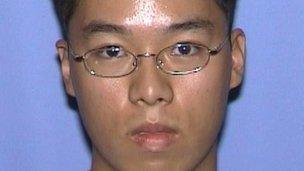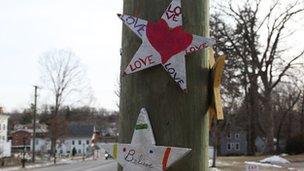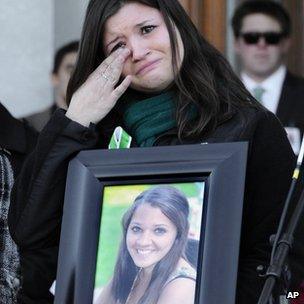Deadly loopholes in US gun laws allows mentally ill to buy weapons
- Published
Panorama's Hilary Andersson goes undercover at a gun show in Texas
The BBC's Panorama team reports on how easy it is to legally buy guns in the US, because of a background-check loophole that the White House wants to close.
President Barack Obama has said he is determined to curb gun violence in America following a series of massacres. Many of America's past mass killings have been carried out by people with mental problems.
In Texas, the BBC legally purchased an AR-15 assault rifle, without filling in any paperwork or answering any questions.
Buying from private dealers is common and, although available data is limited, it estimated that 14%-40% of all American guns sales are sold privately, without any checks at all.
Purchasing a gun through a licensed dealer is different.
The buyer has to pass an FBI background check, but even in these sales the only prohibition on those with mental problems buying guns is on those who have been deemed "mentally defective" by the authorities, or who have been forcibly committed to psychiatric care.
This means that you can have voluntarily spent years in psychiatric hospitals because of severe mental problems and still buy a gun legally in a number of states, the BBC has been advised by gun law experts. Some states have their own laws that close this loophole.
There have been at least 63 mass shootings in America since 1982 and many of the killers have had mental health problems.
There is little relevant medical data about Adam Lanza, the 20-year-old who killed 20 children at Sandy Hook elementary school in Connecticut, but in behavioural terms he had some of the traits the FBI has seen in other mass killers, who have been highly reclusive and troubled.
James Holmes, who killed 12 at a Batman movie premiere in Aurora, Colorado, last summer and Seung-Hui Cho, who gunned down 32 people at Virginia Tech university in 2007 are amongst the killers who have had the lethal combination of mental problems and easy access to guns.
So how many more potential mass killers are out there?

Seung-Hui Cho, who killed 32 people at Virginia Tech in 2007, spent time in a mental health unit in 2005
Some 4.5 million Americans with severe mental health problems were getting no treatment in 2011, because of years of neglect of the mental healthcare system.
Since the Connecticut massacre, several mothers have come forward saying they are concerned about mentally ill sons or daughters.
In Texas we met the family of a 14-year-old boy, "David", who is struggling with a complex of mental health problems and can be violent. His mother says he is normally sweet and funny, but sometimes she is scared of him.
She said: "When he melts down, he is like a 350lb rabid gorilla. Yesterday he broke the mirror and tore up the bathroom and we called the police again."
David's mother keeps him well away from guns but he is being taught how to shoot at a gun range by another relative who views it as recreational.
"He taught him how to shoot a 9mm. It's horrifying because they're teaching him skills that he really does not need to know," David's mother said.
David is by no means unique and the BBC has no reason to believe he could ever pose a major danger to society. He is just unpredictable.

The Sandy Hook massacre has led to renewed calls for gun control
Mental Health America spokesman Steve Vetzner said: "People with mental health conditions are much more likely to be victims of violence than perpetrators and equating mental illness with violence is false."
When interviewed David said he was worried he might get into trouble with the police and end up in jail. Unless the law changes David will be able to buy a gun easily when he is old enough.
President Obama wants to spend more money on mental healthcare. The pro-gun lobbying group the National Rifle Association (NRA) has proposed creating a national database of the mentally ill, a suggestion which was raised concerns about privacy and unfair labelling.
In the UK, when 16 children and their teacher were murdered at a school in Dunblane in 1996 the government immediately introduced legislation to ban handguns, which became law the following year.
In the wake of the Connecticut school massacre in America, President Obama wants to ban assault weapon and high-capacity ammunition clips, and tighten up background checks on those buying guns.
He also wants to close the gun-show loophole which allows the purchase of guns with no checks at all. But in America, no far-reaching ban on handguns, such as the one in the UK, is planned, either on a federal or state level.
There is an ugly political fight raging about the President's gun control proposals and change is unlikely to come without compromise. As things stand in most of the United States, it is as easy to buy a gun now as it was before the Sandy Hook massacre.
Teachers in Texas improve their shooting skills
Many parents and teachers worry about another attack, and some schools in Texas are taking matters into their own hands.
Hundreds of teachers near the Texan town of Moody are training to use guns with the hope of bringing them into their classrooms. They say they feel defenceless without guns.
"It's better than having staplers and tape to defend ourselves - we have nothing," said one teacher.
The National Rifle Association and many conservatives say all schools in America should have some form of armed guard.
"Our children are sitting ducks in those schools because there's no-one there to protect them," said Scottie Hughes, of the conservative Tea Party movement.

Sandy Hook teacher Victoria Soto died trying to shield children in her class from Adam Lanza's bullets
But at White Rock North School, in the Dallas area, principal Amy Adams does not want guns in the classroom, and is taking other measures.
The school has introduced a drill for the children called "lockdown" in case they become the target of the next crazed gunman.
As a speaker blasts out a warning, children as young as five run into the toilets, lock the doors and turn off the lights.
Teachers barricade classroom doors with bookshelves and hold a chair over their heads, ready.
"We probably all assume that this will never happen but the big, bad wolf is standing at the door and we've got to be ready to answer that call when it comes, if it comes," said Ms Adams.
The young children know what is at stake.
Asked why they are doing the drill, one child says: "In case a man comes into the school and shoots us."
While the politicians battle it out, innocence has already been lost in thousands of playgrounds and classrooms around the country as America's children confront the reality of living with guns.
Watch Panorama: America's Gun Addiction on BBC One on Monday 11 March at 20:30 GMT, and for seven days afterwards on the BBC iPlayer.
- Published10 January 2013
- Published16 January 2013
- Published16 January 2013
- Published18 December 2012